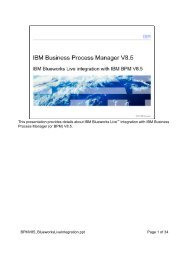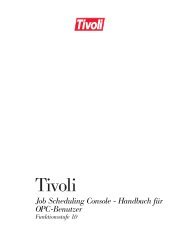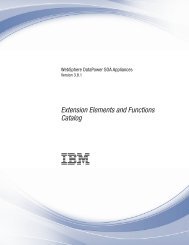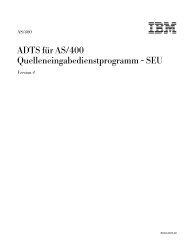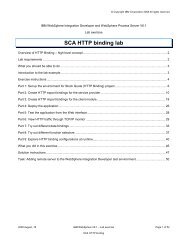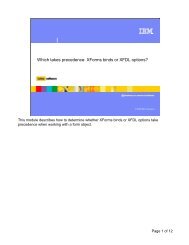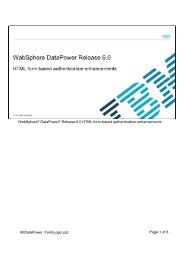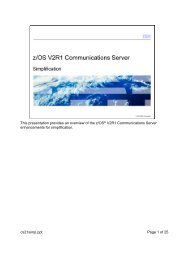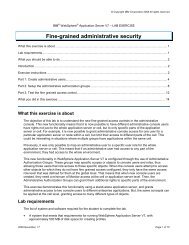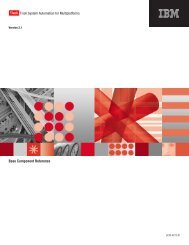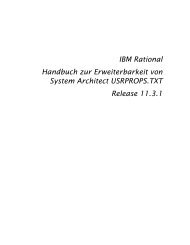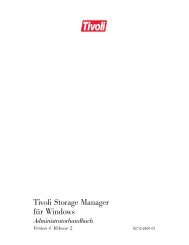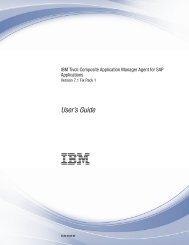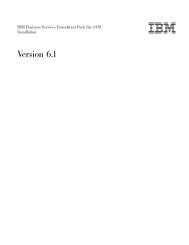z/TPF Program Management - IBM
z/TPF Program Management - IBM
z/TPF Program Management - IBM
Create successful ePaper yourself
Turn your PDF publications into a flip-book with our unique Google optimized e-Paper software.
|<br />
The previous example is the minimal amount that you need to code the CSO<br />
makefile. With no other changes, this defines the CSO as exporting all functions<br />
and having an entry named BILL.<br />
Like the BSOs, both the billing and base_rt environment files are listed. The<br />
base_rt environment file included with z/<strong>TPF</strong> is almost always required to<br />
enable the application program to access macros and includes that are included<br />
in z/<strong>TPF</strong>. The first environment listed defines the owning environment and,<br />
therefore, the corresponding environment file defines the directory (under the<br />
first root directory listed) that is used for writing listings, objects, and<br />
executables. Both environments are used to define where the source files<br />
(including macros and include files) are found.<br />
a. To define the CSO as a main program, add the following line to the makefile:<br />
APP_ENTRY := main<br />
b. To specify that there is only one entry point for this program and to make all<br />
other functions in the program local to the program, add the following line to<br />
the makefile: APP_EXPORT := ENTRY<br />
c. To define an entry point name, add the following line to the makefile. The<br />
value specified can be any function name or the CSO name: APP_ENTRY :=<br />
EntryName<br />
Note: You must add APP_ENTRY when APP_EXPORT := ENTRY is specified.<br />
If no entry is given, the CSO cannot be entered.<br />
d. To specify that all functions in the CSO can be called externally, no action is<br />
needed; APP_EXPORT := ALL is the default.<br />
Note: You also can specify APP_ENTRY with APP_EXPORT := ALL to define<br />
the entry point name. If no entry is given, the CSO cannot be<br />
entered.<br />
e. To limit the functions in the CSO that can be called externally, add the<br />
following line to the makefile: APP_EXPORT := LIST<br />
This requires that you also create an export file, which defines which<br />
functions are global or local. See “Create an export file” on page 69 for<br />
information about how to create the export file.<br />
An alternative way to limit the functions in the CSO that can be called<br />
externally is to use the -fvisibility compiler option. Specify<br />
-fvisibility=default to indicate that the functions in the CSO are identified<br />
as global for the shared object. Specify -fvisibility=hidden to indicate that<br />
all C/C++ functions are local except where they are coded with<br />
__attribute__((visibility("default"))).<br />
Note: You also can specify APP_ENTRY to define the entry point name. If<br />
no entry is given, the CSO cannot be entered.<br />
f. To call functions in other CSOs, the referenced CSOs must be listed in the<br />
calling makefile. The exception is for any of the CSOs that are defined as<br />
standard libraries, such as:<br />
v CISO<br />
v CLBM<br />
v <strong>TPF</strong>STUB<br />
v USRSTUB<br />
v CTIS<br />
v CTAL<br />
v CFVS<br />
Assemble, compile, and link (build) application programs 65



